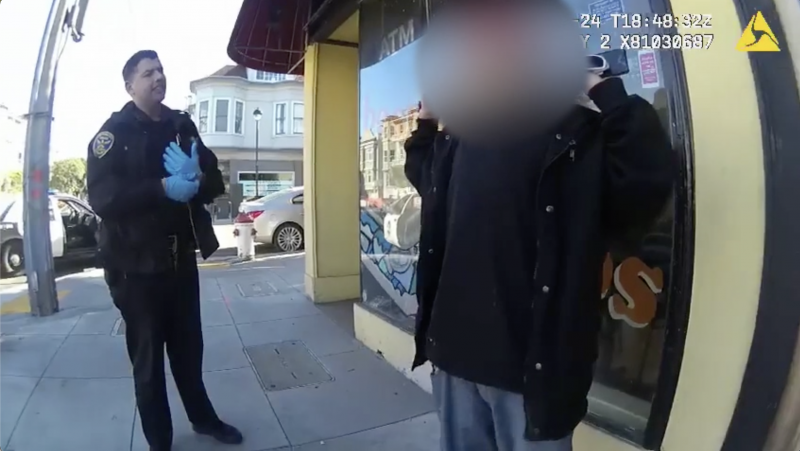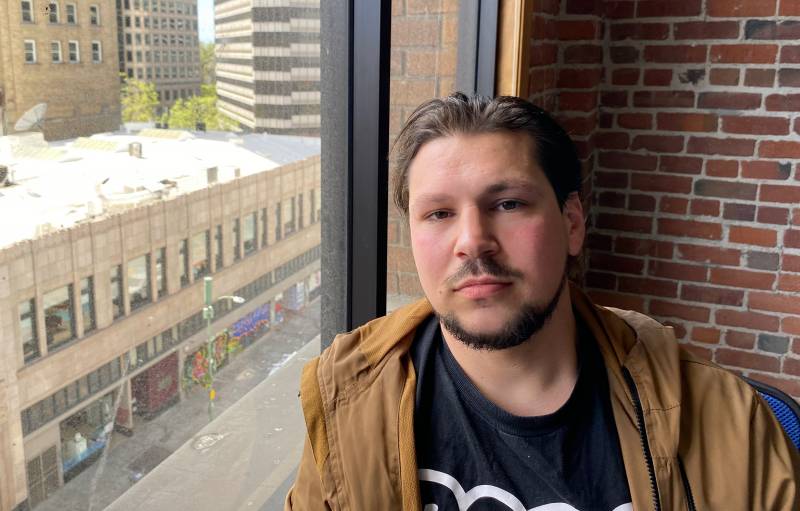“The fact that he was walking away, failing to comply with commands, being verbally aggressive towards us, it’s my training and experience that that is an indicator that somebody might have weapons on their persons and for the safety of myself and my partner, fear of our safety I conducted a pat search,” he said, according to a recording of the interview released by the DPA.
But the report pointed out that, during the exchange, the only time Shiheiber reached into his pocket was when he gave the officers his identification, which can be seen on body camera footage. He does not act violent in any way, and there are no visible bulges that would indicate a weapon.
“Officer Brett Hernandez used buzzwords in place of facts — ‘totality of circumstances,’ ‘aggressive,’ and ‘officer safety’ are words often used in place of hard facts,” the report found. Shiheiber, according to the report, “failed the attitude test. He deigned to argue with police officers and assert his Fourth Amendment rights.”
Hernandez also told investigators that Shiheiber tried to flee from officers.
“This is simply not true – once it was clear that the police were detaining [redacted] he made no attempt to ‘flee,’” the report reads.
This is a stunning finding because a police officer’s credibility is at the heart of their ability to do their jobs — to write police reports and provide sworn testimony.
If a police officer with credibility issues is called to testify in a criminal case, the district attorney also is required to notify the defendant in that case, according to the Supreme Court ruling Brady v. Maryland. To meet this obligation, Rachel Marshall, director of communications and policy adviser for the San Francisco DA, said in an email that the SFPD has formally agreed it will proactively notify prosecutors “when they learn that one of their members has potential Brady materials in their personnel file.”
Marshall wrote that her office is “not aware of this incident and are unaware of any cases impacted by it.” She said recent police transparency laws SB 16 and SB 1421 have helped prosecutors comply with Brady.
“Officer Hernandez was never formally accused of dishonesty and no finding of dishonesty was suggested during this process,” Shea wrote in an email.
The DPA did not charge Hernandez with dishonesty, according to the documents. Wargo-Wilson said she could not comment on the reasons for that.
The San Francisco Police Commission suspended Hernandez for 10 days with another five days that would be imposed if Hernandez violated policy again, and it ordered him to get more training.
In its conclusion, the commission found video of the incident “damning and disturbing.”
“If [redacted] can be mistreated this way by the police under the circumstances of this case, then anyone on the street may be subject to a pat search on flimsy grounds,” the DPA’s report reads.
“This case involves poor policing that resulted in a violation of [redacted’s] rights, but the potential damage of police misconduct such as that of Officer Hernandez implicates the community as a whole, not just [redacted].”
The documents released this week do not definitively indicate whether Chief Scott agreed with the DPA’s findings, and his spokesperson said he declined to comment on the case. But the documents show that Hernandez’s attorney told the police commission that the chief disagreed with the DPA.
“The plight of Officer Hernandez is an example of the overreach and lack of knowledge regarding the law by the Police Commission and the Department of Police Accountability,” Shea wrote in an email.
Hernandez appealed his discipline, but on Feb. 1, 2022, an administrative law judge with the city’s Office of Administrative Hearings ruled the discipline would stand.
Shiheiber said he didn’t know about the officer’s suspension until KQED contacted him for an interview. He said he’s gratified by the findings of the DPA and the commission, but questioned why Hernandez was still on the force at all.
“Police are supposed to be held to a higher standard,” he said. “They’re not supposed to be above the law.”
Shiheiber also filed a civil lawsuit against the city, which is ongoing. He said police officers do have a difficult and dangerous job.
“If I was a police officer, I wouldn’t make my job harder and go mess with people that didn’t warrant my attention,” he said. “‘Cause there’s actual things out there.”
This story has been updated to include comment from SFPD Officer Brett Hernandez’s attorney Christopher Shea.
Above, read the full transcript of Officer Brett Hernandez’s administrative hearing, hosted on DocumentCloud.


